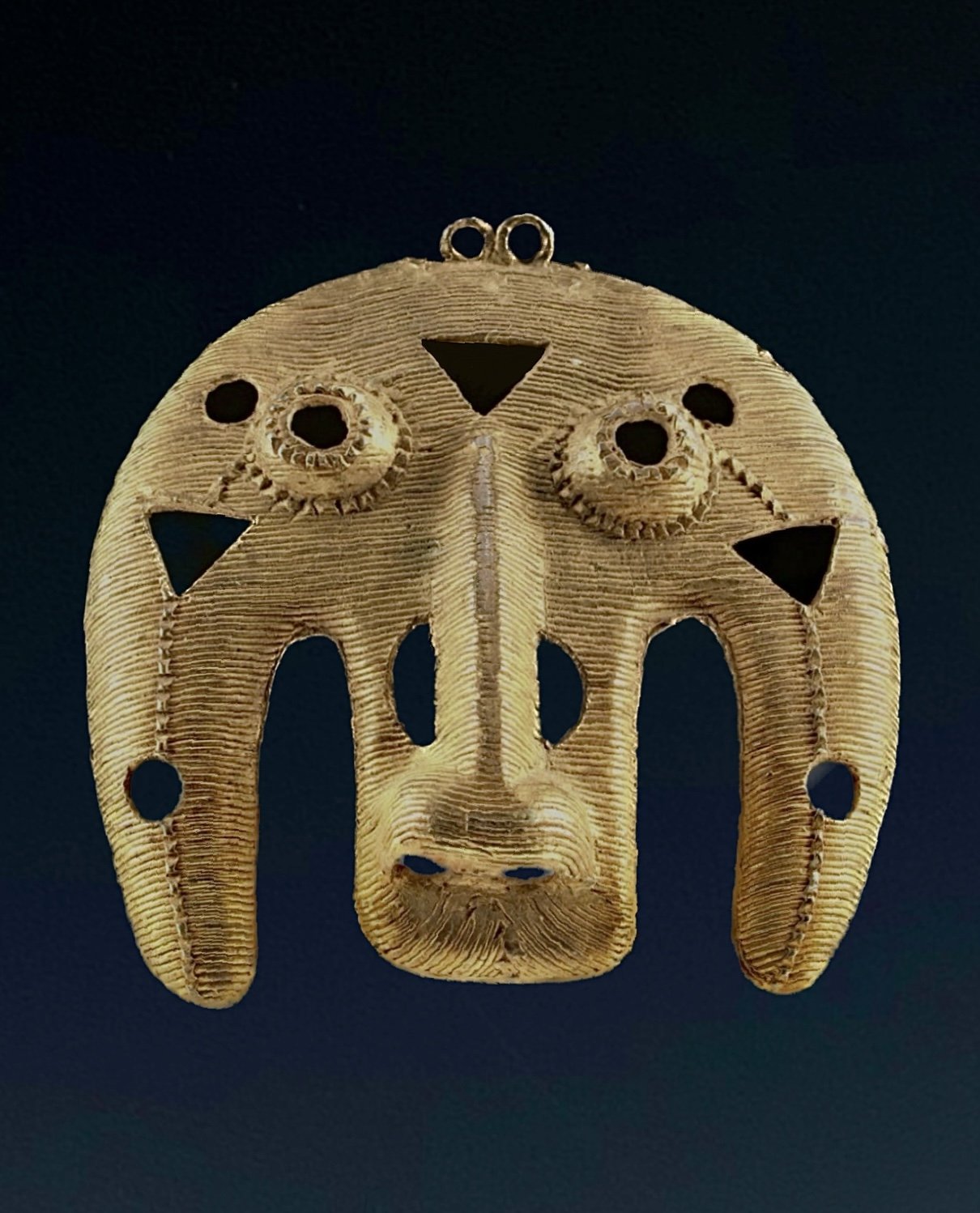Akan and Baule gold pendants are a traditional form of jewelry worn by the Akan and Baule people, ethnic groups found in Ghana and Ivory Coast. Although Baule are a different ethnic group than the Akan, they share similar cultural and regalia traditions. Cast in gold using the lost wax technique, the pendants feature intricate designs and patterns that are specific to Akan and Baule culture.
The Akan and Baule people have a long history of goldsmithing and metalworking, and their jewelry is known for its intricate designs and skilled craftsmanship. The gold pendants may feature a variety of designs, such as human or animal figures, geometric shapes, or abstract patterns. Pendant masks are believed to represent the spirit of the wearer, a loved one or ancestor, and are often worn during important ceremonies and events, such as weddings, funerals, and religious festivals. They are also believed to have protective properties, warding off evil spirits and bringing good luck to the wearer.
In addition to their decorative function, their gold pendants also have cultural and symbolic significance often referring to proverbs. They are often given as gifts to mark important occasions, such as weddings or funerals, and may be passed down through families as heirlooms. The pendants may also be imbued with spiritual or religious meaning, and may be used in traditional rituals and ceremonies.

Akan cast gold pendant mask, Côte D’Ivoire/Ghana 9.70cm. From the estate of Olga Hirshhorn


Akan crocodile pendant. Cast gold. 13.30cm. Côte D’Ivoire/Ghana. From the estate of Olga Hirshhorn


Lagoons people, cast gold alloy pendant of a coiled snake in fine wax thread technique. 3.9” L x 3” W. In Akan and Baule proverbs the coiled snake often are symbols of femininity and fertility. Ex Zemanek-Münster ex Roland Hartman ex René David ex Roger Bédiat

Royal court pendant of a crocodile. Akan, Cast gold alloy. 18cm (7.08 inches). Crocodiles are popular Akan subjects for sword ornaments (abosodeɛ). A royal appellation “Dɛnkyɛm niampa a ɛduru afeɛ a ɔmene boɔ”— “The great crocodile that swallows a stone every year. Gallery Walu, Zurich, Estate of René David (1928-2015), Zurich. Exhibited: Musée International du Golfe de Guinée, Togo (2005-2011)

Akan pendant in the form of a beetle. Côte d’Ivoire. Cast gold alloy, H 7 cm. Published: Lüthi, Werner & David, Jean (2009). Exhibition catalog: Helvetic Gold Museum Burgdorf. Gold in the art of West Africa. Zurich: Galerie Walu, p. 38. Exhibited: 2009: Helvetic Gold Museum Burgdorf.


Akan cast gold alloy pendant in the form of an abstract beetle or possibly the lozenge-shaped traditional design called “kontro bie” or "female crab" by the Ebrie, Côte d’Ivoire. H 5.9 cm. W 8.9 cm. Published: Lüthi, Werner & David, Jean (2009). Exhibition catalog: Helvetic Gold Museum Burgdorf. Gold in the art of West Africa. Zurich: Gallery Walu, p. 25. Exhibited: 2009: Helvetic Gold Museum Burgdorf.

Akan pendant of a banana harvesting knife. Côte d’Ivoire. Cast gold alloy, H 10.5 cm. B 7.5 cm. From the Estate of René David, Zurich.

Lagoons region Côte d’Ivoire (Akan or Baoulé) anthropomorphic ram’s head pendant. Cast silver and gold alloy (79% silver, 15% gold, 63.3 g), 8.4 cm x 8.4 cm. “Baoulé and Lagoon region goldsmiths explain the wonderful variety of abstract rams' heads citing the saying, "My strength is in my horns. The ram signifies the chief, for it is powerful, intelligent and wise". (Garrard, Ross). Here, the pendant is a combination of an ancestral head with the symbolic strength of a ram. EX collection of Constance McCormick Fearing (estate), Montecito, California, USA, acquired before 2004.


An Akan or Baule gilded copper alloy pendant with two birds and an elephant. 3.5” dia. Côte d’Ivoire, Ghana. EX Paul Tishman collection (NY) by decent. “Paul Tishman was often asked why he and his wife Ruth decided to collect African art. His simple reply: How does one fall in love?” Most of the Tishman collection was bought by the Walt Disney company in the mid 80s and in 2005, Disney donated all 525 objects in the collection to the Smithsonian National Museum of African art.


This is an Akan gold alloy pendant from an exceptional Akan necklace from Ghana/ Côte D’Ivoire consisting of gold beads (10K-18K) alternating with rare large glass Venetian cylindrical beads (1850-1920). The pendant is a downward pointing crescent moon shape with spikes or rays at the top, 4 3/4” L. Ex collection of Dr. Arikana Chihombori-Quao and Dr. Nii S. Quao. Dr. Arikana-Quao was the African Union’s Ambassador to the United States.